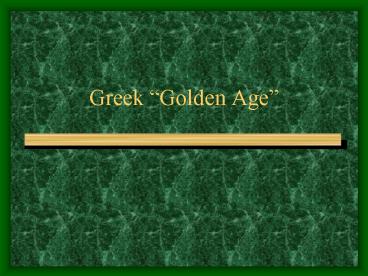Greek Golden Age - PowerPoint PPT Presentation
1 / 13
Title:
Greek Golden Age
Description:
Greek 'Golden Age' Archaic Literature. Hesiod Works and Days. Sappho love poems ... Aphrodite. Poseidon. Greek Religion (2) Each city had a patron god/goddess. ... – PowerPoint PPT presentation
Number of Views:123
Avg rating:3.0/5.0
Title: Greek Golden Age
1
Greek Golden Age
2
Archaic Literature
- Hesiod Works and Days
- Sappho love poems
- Theognis elegiac poetry
3
Greek Religion
- Social, functional
- Temples were the major buildings
- Ritual, not doctrine
- 12 Olympian Gods
- Zeus
- Athena
- Apollo
- Aphrodite
- Poseidon
4
Greek Religion (2)
- Each city had a patron god/goddess.
- Major festivals Olympics (776)
- Oracles and divination
- Delphi
- Mystery cults
- Search for life after death
- Eleusinian cult
5
Athenian Empire
- Constructed after Persian Wars
- Delian League
- Smaller states contributed money, not ships
- Kept in force after Persian threat receded
6
Age of Pericles
- Tribute money made Athens rich.
- Shipbuilding
- Public works
- 461 Pericles comes to power, remains until 429
7
Athenian Democracy
- Democracy expanded under Pericles
- Lower-class citizens could hold office.
- Public offices became salaried.
- Practice of ostracism
- Is democracy good?
- Pericles Funeral Oration
- Plato and Aristotle
8
Peloponnesian War (431-404)
- Expansion of Athenian empire provokes Sparta
- Sicilian Expedition (415)
- 404 Athens surrenders, loses empire
9
Decline of the City-States
- Athens recovers after 404, but is never dominant
again - Sparta attempts to unite Greeks against Persia
but fails - 371 Thebes defeats Sparta
- Sporadic intercity warfare and civil war
continues until 338
10
Macedonia
- Philip II (359-336)
- Admired Greek culture
- Strengthened Macedonian forces
- Demosthenes and the Philippics
- Battle of Chaeronea (338)
- 336 Philip is assassinated
11
The Greek Dilemma
- Decentralized poleis versus empires
- Problems of democracy
- Ineffective without strong civic spirit
- Prone to demagoguery
- Temptation of imperial overreach
12
The First Historians
- Historia researches
- Herodotus (c. 484 c. 425)
- Father of History
- Recounted the Persian Wars and background
- Records myths and hearsay, but is critical of
sources
13
The First Historians (2)
- Thucydides (c. 460 c. 400)
- Greatest ancient historian
- Covered the Peloponnesian War
- Rational view of history and causes
- Commented on human nature































